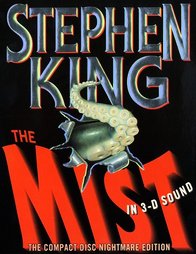 Frank Darabont’s career has been closely associated with Stephen King – his first two directorial efforts, The Shawshank Redemption and The Green Mile (coming next week on a 2 disc DVD you can buy here), were King adaptations. After a go-round with Jim Carrey in The Majestic, Darabont is returning to King territory with a long-awaited adaptation of The Mist, a novella about a thick, strange mist filled with deadly monsters that comes upon a small town. A group of people take refuge in a local supermarket; bad things happen.
Frank Darabont’s career has been closely associated with Stephen King – his first two directorial efforts, The Shawshank Redemption and The Green Mile (coming next week on a 2 disc DVD you can buy here), were King adaptations. After a go-round with Jim Carrey in The Majestic, Darabont is returning to King territory with a long-awaited adaptation of The Mist, a novella about a thick, strange mist filled with deadly monsters that comes upon a small town. A group of people take refuge in a local supermarket; bad things happen.
When I talked to Darabont on the phone about the new edition of The Green Mile I made sure to find out how The Mist affects his planned adaptation of Ray Bradbury’s Fahrenheit 451 (it’s still happening, and read on for Darabont’s thoughts about its continued relevance). He also revealed that Dimension is letting him make The Mist as dark as he wants, that he’s being influenced by Danny Boyle’s 28 Days Later when it comes to making the movie quickly, and that the monsters are going to be “cool.”
Will you be changing the setting of The Mist to a prison, so you can go for the Stephen King prison hat trick?
Darabont: [laughs] Well, you know, when you think about it, that supermarket does become kind of a prison. Maybe I’m drawn to those enclosed, pressure-cooker stories of Steve’s!
The Mist is a novella, but it reads very fast.
Darabont: It gallops along, doesn’t it? The movie will as well; there’s not going to be the same kind of pace that either Shawshank or Green Mile had. It doesn’t warrant it or call for it. It’ll be a pretty fast and furious narrative, really. And I’m certain the shortest film I’ve made to date.
And very different from any of the other movies you’ve directed – it’s much more of a standard horror film than any of your other movies.
Darabont: Absolutely. But thankfully there’s a core, that wonderful array of Stephen King characters, which is his strength. There’s a lot of meat there for the actors and the director.
I’ve always thought of it as Stephen King’s Lord of the Flies, because it’s less about the monsters – which are important, certainly. If you’re going to do a horror movie you might as well have some really cool monsters – but it’s more about the disintegration of civilization in that supermarket, how everything breaks down for those people in there. From that standpoint it’s a fascinating story to tell.
Where does The Mist put Fahrenheit 451? Is it not happening, or happening later?
Darabont: While I’m doing The Mist – which is going to be a really quick project; it’s very low budget, very fast, not unlike what Danny Boyle did in 28 Days Later, which I found very inspiring in terms of, hell, just go out and make a movie and have fun with it –
Are you going to shoot it on DV or on film?
Darabont: Still working out those details, actually. I think on film, but with a few little tricks up my sleeve.
But while I’m doing this process, I’m going to be keeping my eye on the ball of Fahrenheit 451. I’m going to be doing a lot of long range prep work on that while I’m making The Mist. That’s hopefully going to go next right after Mist is done.
What’s the timeline on The Mist?
Darabont: It’s going to be fast and furious, pal. I just started prepping and we’re going to be shooting maybe February. When I say fast, I ain’t kidding around.
Has casting started?
Darabont: We’re starting casting right now; we’re starting this week. We’re starting to get out there and look around and see who’s out there and who’s available.
Dimension is going to let you do a grown up version of The Mist? They’re not going to make you fill the film with teeny bopper actors from TV shows?
Darabont: I think they’re legitimately really super excited about this. Unlike some other folks I have spoken to, they’re really embracing the darker and edgier choices. Bob Weinstein is being tremendously supportive, and that makes me very happy.
Fahrenheit 451 almost doesn’t need to be modernized – except that maybe the whole idea of books as the source of information is becoming outdated.
Darabont: The thing about all this technology is that there isn’t any of it that can’t be monitored and controlled. When people say that books will no longer be relevant in the future, that’s ludicrous to me because it’s the only place you’ll be able to hide anything. Will you be able to hide it in your computer? If things keep going the way they are, all of that will be analyzed, scanned and controlled. You’re not going to be able to use this technology to hide things. So where do you hide things? In the pages of the book. And as Bradbury’s great, poetic point is, the ultimate hiding place is in the human mind. To me that’s about as timeless and relevant as any statement you can make.
Look for the full interview next week, where we talk about Darbont’s disappointment with how his script for Branagh’s Frankenstein was treated, his thoughts on screenwriters in the Hollywood foodchain, and his big praise for Pan’s Labyrinth.